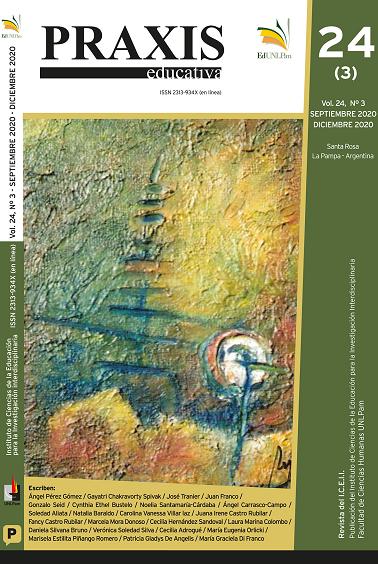Curricular divisions and teaching of research. Methodological subjects in the Sociology degree programs.
DOI:
https://doi.org/10.19137/praxiseducativa-2020-240305Keywords:
methodology, research, sociology, teaching, curriculumAbstract
The Research Methodology course is part of the curriculum of many undergraduate, graduate and postgraduate careers, in very different professional areas and disciplines. In university undergraduate courses in Sociology, Research Methodology constitutes one of the main axes of curriculum design, and several subjects usually cover this area. In this article, from the survey of study plans of different Sociology programs and of the subject syllabuses related to research methodology, we describe some differences in the curricular organization and the implications of these variants in the transmission of methodological knowledge in the training of sociologists.
Downloads
References
Alvarez, G. y Morales, N. (2012). Acuerdo con la formación metodológica recibida entre estudiantes de sociología: análisis exploratorio de su faz multidimensional. Ponencia presentada en las VII Jornadas de Sociología de la UNLP «Argentina en el escenario latinoamericano actual: debates desde las ciencias sociales», 5-7 de diciembre, La Plata, Argentina.
Barriga, O y Henríquez, G. (2004). Artesanía y Técnica en la Enseñanza de la Metodología de la Investigación Social. Cinta de Moebio. Revista de Epistemología de Ciencias Sociales 20: 126-131. url: https://cintademoebio.uchile.cl/index.php/CDM/article/view/26114/27414
Bazzano, M. y Montera, C. (2015). Enseñar a investigar: reflexiones sobre el trabajo con datos secundarios en el marco de la Metodología de la Investigación en Ciencias Sociales. XI Jornadas de Sociología de la UBA. Coordenadas contemporáneas de la sociología: tiempos, cuerpos, saberes. Buenos Aires, 13 al 17 de Julio.
De Sena, A. (2013). Estudiantes de sociología: ¿herederos como siempre?, pp. 153-170. En F. Nievas (comp.). Mosaico de sentidos. Vida cotidiana, conflicto y estructura social. Argentina: Estudios Sociológicos Editora.
De Sena, A. y Grinszpun, M. (2011). Futuros sociólogos: conociendo a los alumnos de metodología. Intersticios. Revista Sociológica de Pensamiento Crítico 5(1): 33-45. url: https://www.intersticios.es/article/view/6119/5745
Di Virgilio, M. M., Fraga, C., Najmias, C., Navarro, A., Perea, C. M., y Plotno, G. S. (2007). Competencias para el trabajo de campo cualitativo: formando investigadores en Ciencias Sociales. Revista argentina de sociología, 5(9), 90-110.
Moreno, M. y Morales, N. (2014). La formación metodológica desde la perspectiva de los estudiantes. Consideraciones alrededor de la sociología, la metodología y la proyección laboral. Entramados y perspectivas (4)4: 115-144. url: https://publicaciones.sociales.uba.ar/index.php/entramadosyperspectivas/article/view/530/468
Obwuegbuzie, A. J., & Leech, N. L. (2005). Taking the ‘Q’ out of research: Teaching research methodology courses without the divide between quantitative and qualitative paradigms. Paper presented at the meeting of American Educational Research Association, Chicago, IL.
Odorizzi, E., y Pagani, M. L. (2010). La trastienda de la enseñanza de la metodología de la investigación social. Questión, 1.
Rodríguez Zoya, L. (2009). Desafíos pedagógicos de la enseñanza de metodología de la investigación: hacia una reconceptualización antropológica del sujeto de aprendizaje. Revista Integra Educativa, 2(2), 105-126.
Scribano, A.; Gandía, C. y Magallanes, G. (2006). La enseñanza de la metodología de la investigación en Ciencias Sociales. Ciencias Sociales Online, (3)1. url: http://www.uvm.cl/csonline/2006_1/pdf/ense%F1anza.pdf
Scribano A.; Gandía, C.; Magallanes G.; Vergara G. (2007). Metodología de la Investigación Social. UNVM. Buena Vista: Córdoba.
Seid, G. (2012). Las particularidades de las asignaturas metodológicas desde las perspectivas de los estudiantes, pp. 145-161. En J. Piovani, M. Carreño, J. Castellanos (Eds.) Memorias del III Encuentro Latinoamericano de Metodología de las Ciencias Sociales (ELMeCS). Manizales: Universidad de Caldas/Universidad de Manizales/RedMet.
Seid, G., Fernández, P. y Malegaríe, J. (2015). Entre el método científico y la práctica del oficio. Estrategias de enseñanza de tabulación y análisis de datos en investigación social. Revista Latinoamericana de Metodología de las Ciencias Sociales (ReLMeCS) 6(2): 1-16. url: https://www.relmecs.fahce.unlp.edu.ar/article/view/relmecse011
Downloads
Published
Issue
Section
License
Copyright Notice
Editorial Committee Educational Praxis Magazine:
I hereby declare that I am the author of the article titled (article name), that it is original and my own and that it was not previously published in any other format or medium. I declare to know that the magazine will not charge me any type of fee under any circumstances, nor will I receive any type of monetary compensation If it were accepted for publication in Educational Praxis, I authorize the aforementioned magazine to publish it digitally and to advertise it on its social networks.
If the work is published, I adhere to the Creative Commons license called "Attribution - Non-Commercial Share Alike CC BY-NC-SA", through which it is allowed to copy, reproduce, distribute, publicly communicate the work and generate derivative works, as long as when the original author is cited and acknowledged. This license has been used since September 2018. In 2016 CC BY NC ND 4.0 was adhered to; and in the years 2017 and 2018 (January-August) CC BY NC 4.0.
This CC BY-NC-SA Share Alike license does not, however, permit commercial use of the work. As an author, the journal may establish additional agreements for the non-exclusive distribution of the version of the work published in the journal, it allows me to self-archive the published articles, in their post-print version, in institutional, thematic repositories, personal web pages or any other relevant use. with the recognition of having been first published in this journal.
Educational Praxis adheres to DORA (Declaration on Research Assessment) signed in San Francisco, California, on December 16, 2012, and to the Declaration of Mexico (Joint Declaration LATINDEX - REDALYC - CLACSO - IBICT).















_(1)2.png)


3.png)











_(2).png)






2.jpg)









